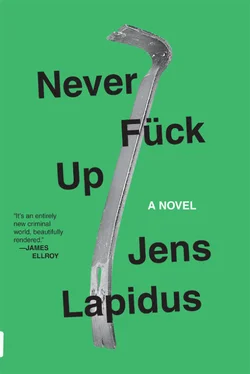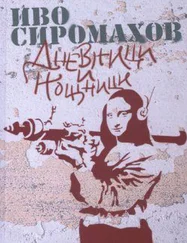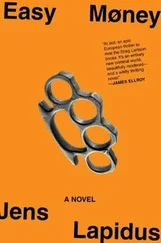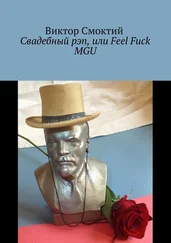Stefanovic let the words hang in the air for a second. Then he hissed, “Find him.”
Up in the ring, the giants were going at it. Ståhl was alternating between feeding uppercuts and jabs. The Belarusian guard was gradually being lowered. His head hung, he seemed unfocused. After two more minutes: bam. The Swede landed a brutal power punch. The Belarusian bounced against the ropes. Ståhl went in close. Grabbed Akhramenko’s neck. Pressed the giant down. Kneed him with full force. The sound of something cracking in Akhramenko’s jaw. The mouth guard went flying. A brief second: silence in the arena. Then he sank down to the mat.
Mahmud’s thoughts were in mad tumult. First and foremost: the offer from the Yugos was in many ways an easy gig. To find a dude like Wisam couldn’t be impossible, if he was in Stockholm. At the same time: the guy was a family friend. The guy was from his hood, an Arab. What did that say about Mahmud’s honor? At the same time: he needed this more than ever. With the debt to Gürhan. And his own honor to win back.
Stefanovic got up. The man’d just lost a hundred G’s. Maybe there were still some clean sports left—the Yugos didn’t seem to control everything in this city, after all. Mahmud eyed his face. Completely expressionless.
Stefanovic turned to him.
“Call me when you’re done thinking. By Monday.”
Then he left.
8

Niklas’d been in the shower for forty minutes. Mom was at work so it didn’t matter: he could occupy the bathroom for as long as he liked.
How long was she going to be staying with him? Okay, of course a dead person in the basement was unpleasant. But it was good, too. Maybe it had made her think, change.
Unfortunately, Niklas’d also been dragged into it. Later today he was going in for questioning by the police. Questions were spinning around in the steam under the showerhead. He wondered what they thought they were going to get out of him. How should he deal with questions that got too personal? It was strange—how did they even know that he’d been living with his mom? Maybe some neighbor’d ratted him out, or else it was Mom who’d let it slip.
Damn—this meant trouble. He’d actually thought he’d be spared. It had to be one of Mom’s neighbors. Scared, shocked, nervous. Spit out stuff that really should have nothing to do with it. Probably told the cops that a young man’d been living with her, maybe her son. He just couldn’t think of who’d even seen him in the building.
The shower was crappy. Rust-brown dirt between the tiles. White residue on the showerhead that looked like old toothpaste. The water barely drained. Didn’t seem like the off-the-books broker asshole had the drain cleaned out too often. A thought in Niklas’s head: Civilized man couldn’t survive long without holes. Holes were the basis of cleanliness. A busted shower drain, and life got difficult. Too much toilet paper in the toilet or hair in the sink—a quick way for a bathroom to quit working. And the kitchen—things ran out through small holes in the drain, disappeared forever from the world of the cushy and comfy. Without them having to think about where it all went. No one cared what really happened with everything that didn’t belong in an ordered household: hair, toothpaste spit, food scraps, old milk, excrement. Holes were the most important ingredient in the recipe for comfort. They maintained Western citizens’ embarrassing ignorance about real filth. It was actually pretty remarkable that nothing ever came up out of those holes. Infringed on the pretend spotlessness. Invaded the inner sanctity of the home. But Niklas knew—he didn’t trust the holes. Didn’t need them. He’d survived without them under circumstances that were significantly worse than anything a Sven could even imagine.
He shuddered at the thought of what could come up through holes. Horror stories from childhood. Real experiences from Basra, Fallujah, the desert, the mountains. Every man who’s lived too long in a barracks knew what he was thinking about. As soon as you set your foot outside the zone, the sewage pipes were flooded with floating shit.
Freshly showered and clean, in front of the TV. Newly bought DVD player in gleaming plastic. Fatigue and lethargy, overlapped. He was still sleeping like shit at night. Eight years in tents, barracks, compounds, cramped one-bedrooms with other men—it’d made its mark. Loneliness hit him every night like the recoil from a poorly handled assault rifle. Not that he totally freaked out—just like a pounding in his soul that disturbed the balance.
He abstained from popping some of the pills Mom’d brought yesterday: Nitrazepam. Good for calmer nerves, sweeter thoughts, better sleep. But today he needed to be sharp. The people he was meeting today would be able to tell right away by looking at his pupils if he was on something.
He watched Taxi Driver . Really not the right thing for him at the moment. Robert De Niro doing psychotic shooting exercises in front of the mirror. De Niro at a café with the whore—a crazy young Jodie Foster. The shootout with the psycho in the stairwell. Blood everywhere. It didn’t look real. Strange red color, too runny somehow.
The loneliness kept ticking away. He thought, Really, a human being is always alone. You can’t get closer to your fellow man—no matter how good a friend—than you do to your neighbor in the tent. Physically, it can be so close that his bad breath ruins a whole night’s sleep. But in your mind, you never get so close that you can’t get up, pull your pants and shirt on, and disappear forever. And your tent neighbor wouldn’t give a shit.
Niklas was alone. Just him.
Against everyone else.
He closed his eyes for a moment. Listened to the dialogue in the movie.
Time passed as slowly as on surveillance duty down there. SSDD—Same shit, different day. Same anxious thoughts, but in a living room instead.
It was almost time for him to go. Off to the interrogation.
On the subway into the city. Sweden was a different country than the one he’d left—more anonymous, but at the same time more rushed. Back then, he often felt like he was just visiting. Now he really was just visiting. But all the time.
He thought about his exercises. The knives. Polishing the weapons. Well-known situations. Relaxed tasks. The interrogation didn’t really worry him. For the most part, cops were clowns.
Ten minutes later, he walked into the police station. The female guard in the reception area had gray hair parted down the middle. Acted like a stiff soldier. No smile, short, concise questions. Who are you here to see? When? Do you have the extension?
After five minutes, the policeman came and got him.
The interrogation room: empty save for a poster. Pictured a few people around a table toasting one another happily. They might be drinking Aquavit. Maybe it was Midsummer. It was ages since Niklas’d celebrated Midsummer. The cop’d obviously tried to lighten the mood. Two wooden chairs with plush seat cushions, a table that was screwed into the floor, a computer with a small thumb drive attached to it, a cord that was suspended from the ceiling with a wireless mike on the end. The attempt at coziness wasn’t too successful.
The police officer introduced himself. “Hi, my name is Martin Hägerström. And you’re Niklas Brogren?”
“That’s right.”
“Okay. Welcome. Please, have a seat. Do you want some coffee?”
“No, I’m fine. Thanks.”
Martin Hägerström sat down across from him. Logged in to the computer. Niklas eyed the guy. Corduroy pants, knit sweater. His shirt collar was popped. His hair was too messy, he couldn’t be a real cop. Roving gaze. Conclusion: this was a guy who wouldn’t survive more than three hours in the desert.
Читать дальше













